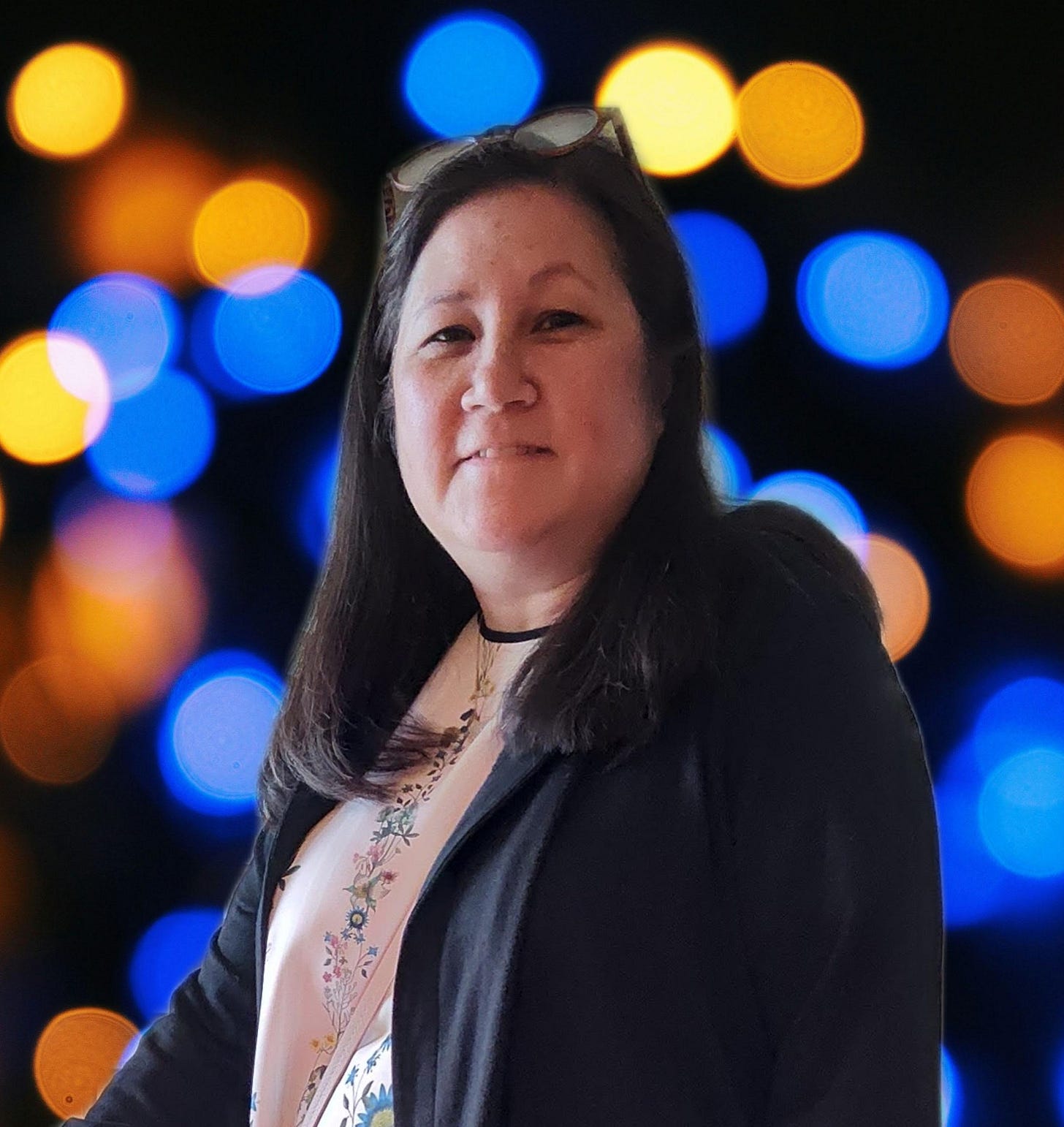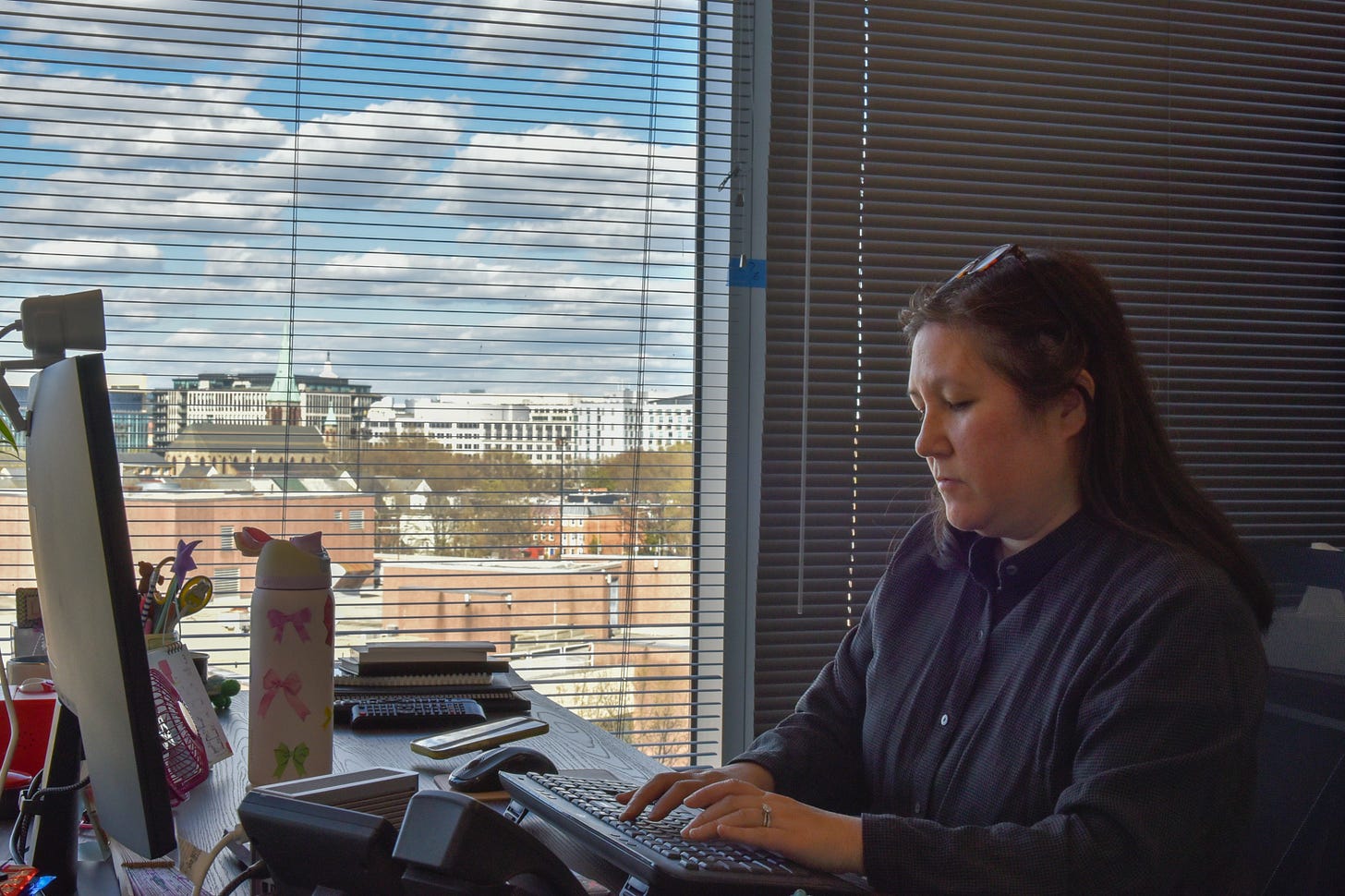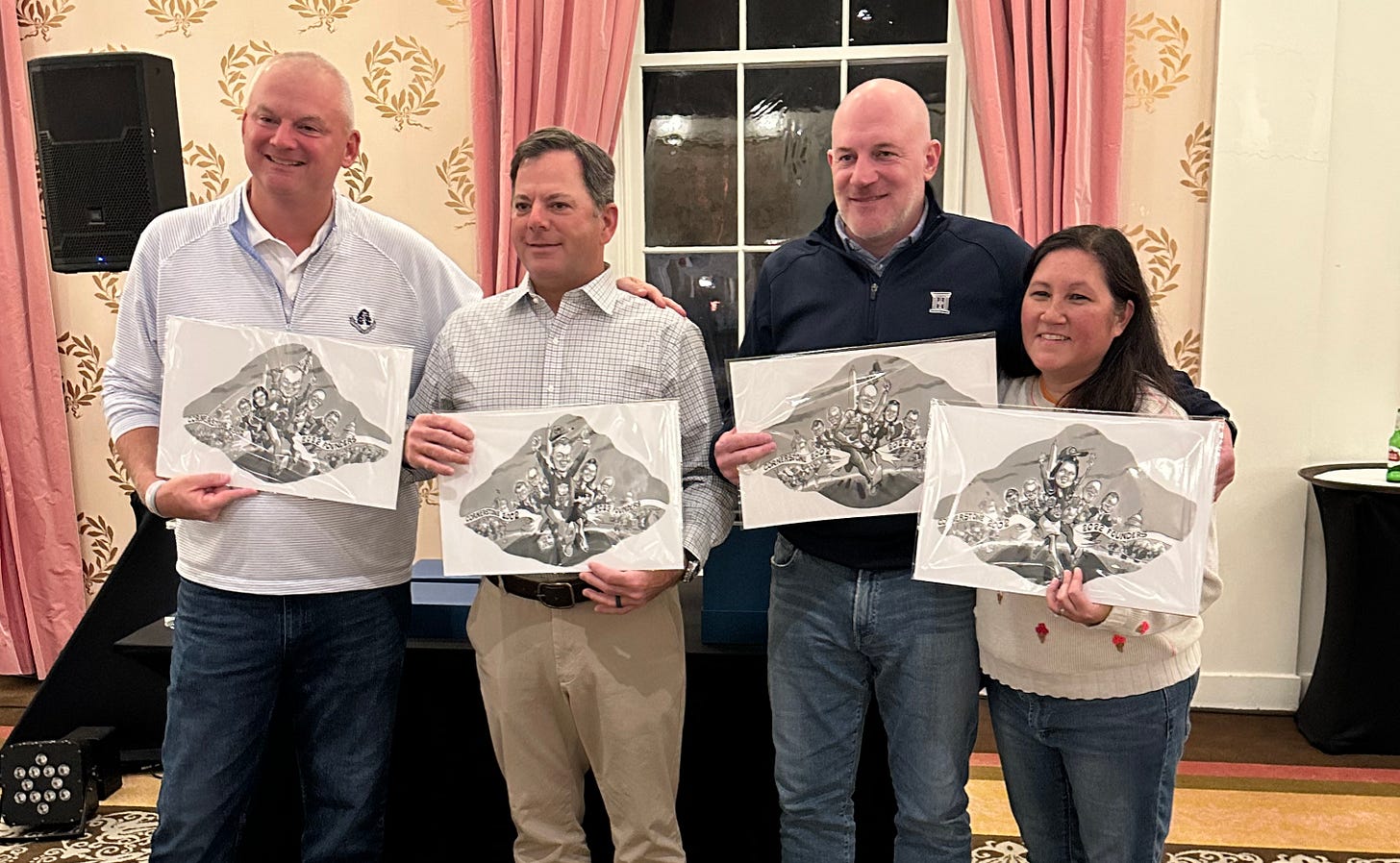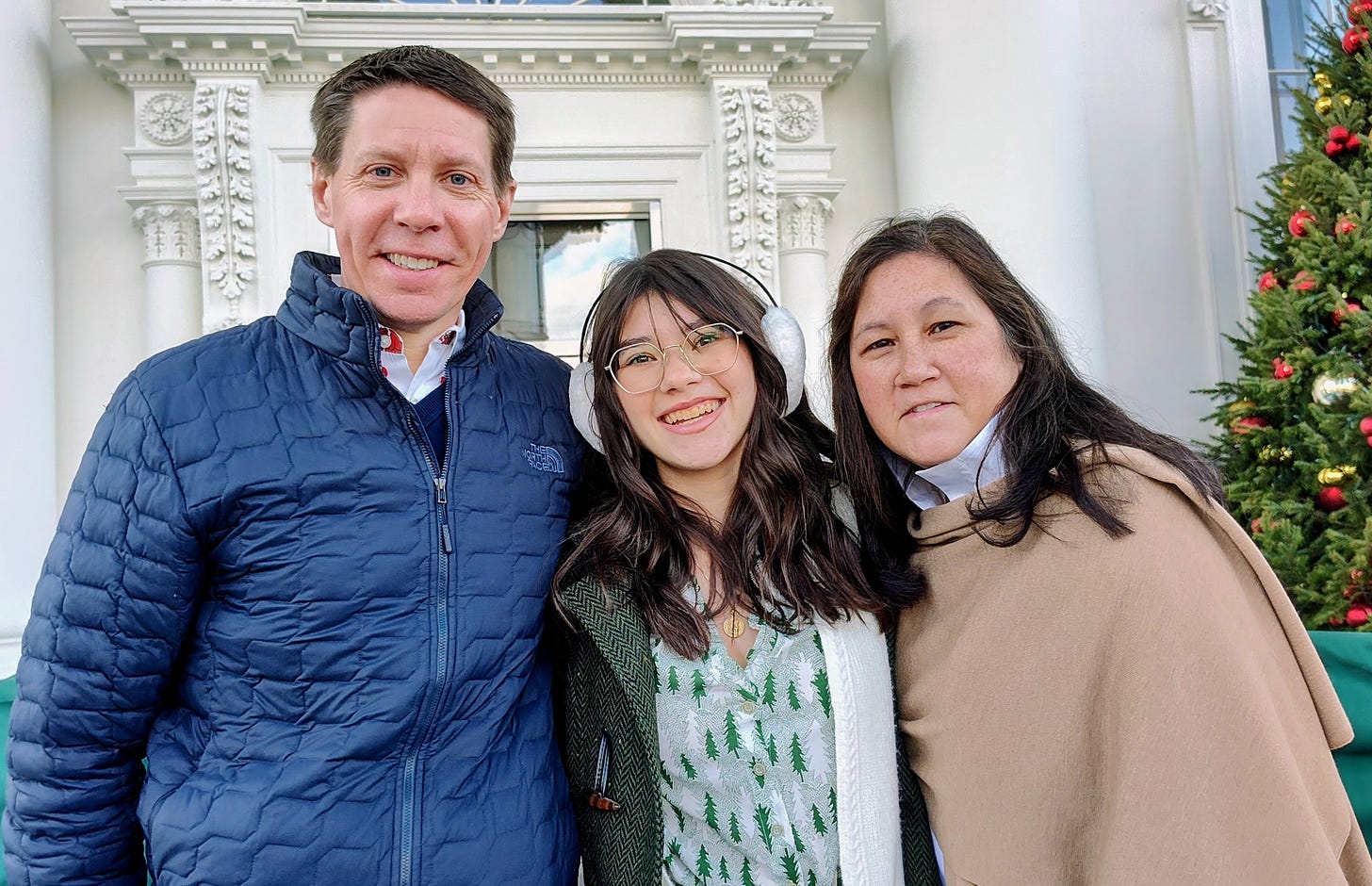Amy Ford Souders: The Unlikely Lobbyist
"Small but mighty" Amy Souders, a long time advocate for health care in Washington.
A little note before we get started…
I’ve known Amy for over 35 years. We went to college together at Marquette University. Her husband Pat and I actually lived on the same floor our freshman year, then worked together as resident hall advisors on the 10th floor of McCormick Hall in its last year as an all-male residence hall. (11 floors of 720 freshmen men in a building that looked like a beer can. What could be more Milwaukee than that?) Amy was an R.A. in another building.
After graduation, she and Pat moved to Washington, D.C. During college, Pat had interned with then-Congressman Dick Durbin, and had a job in his D.C. office. And Amy was planning to work as a lobbyist.
That’s about the extent, really, of what I knew about their jobs from then on until recently. Pat still works for now-Senator Durbin. Amy is a lobbyist. They have a fabulous daughter Elle who’s a sophomore in college and has great taste in pop culture. Period.
I wonder if that isn’t a common experience with good friends from childhood: Over the years you swap stories about work and life, but you don’t really know what you each do, or the impact that your friends have.
Over the last year, Amy let me write a profile about her. And what I learned in talking to her, her colleagues, and those with whom she has worked, was kind of stunning.
The Unlikely Lobbyist
The word “lobbyist” today usually conjures images of a slick white guy with the bro-glamour of Tom Cruise and a bankrupt morality. Lobbyists are guns for hire who don’t care what they’re fighting for, as long as there are enough zeros on the paycheck. They are the political version of fossil fuels, steadily eroding the cause of democracy in our nation.
Then there’s Amy Ford Souders from Cornerstone, one of the country’s most prominent lobbying firms. 5 foot 1 inches tall, Souders is a Japanese-American woman from Chicago with a wry smile who often greets people by quietly saying, “Hello, friend.” Though she is a founding member of Cornerstone, her office is anything but flashy. A wall of windows looks out on a parking garage and street. Alongside family photos one finds a “Hermione 2020” postcard and various Chicago Cubs paraphernalia. Books on her coffee table include a collection of Hayao Miyazaki’s art and Un-American and a collection of photographs of Japanese-Americans incarcerated by the United States government during World War II. Souders’ maternal grandparents spent years interned.
Her portfolio as a lobbyist, too, bears almost no resemblance to the stereotypical lobbying brief. Rather than fat cats with big wallets and personal agendas, Souders has spent her career representing public health officials and other non-profit organizations fighting for funding for things like diabetes prevention and immunization. She represents a group of lobbyists that we rarely hear about, the “white hats” who care about what they’re fighting for and want to make things better.
“How Would You Explain This to Your Aunt?”
At the Cornerstone offices in Washington.
The National Association of Chronic Disease Directors represents the public health officials in state health departments who run programs to help prevent diseases like breast cancer or strokes. When they first approached Souders and her colleague Mark Mioduski in 2003 about getting more appropriation funds for prevention programs, all they knew about lobbying Congress was ‘Write your representatives,’ says Dr. David Hoffman, chairman of its policy committee. “We were rank amateurs.”
But their need was enormous: “Congress was appropriating billions of dollars to treat people for cancer,” he explains, “but only tens of thousands of dollars to prevent cancer. It was totally backwards.”
It was the same with the cause of expanding immunization: A year after Souders co-founded Cornerstone, the pharmaceutical company Merck approached them about starting a coalition to lobby on behalf of greater immunization. The benefit that the work could provide was apparent, says Souders. “It has one of the best cost/benefit analyses you can give: If you spend this much, you’re going to save this much in hospitalizations and prevent death and disability.” Souders and Mioduski ended up bringing together 5 drug companies and 150 non-profits into a new organization called the 317 Coalition. Today they are regarded as the main lobbying group for immunizations. “Other groups adopt our recommendations,” says Mioduski. “They trust us. We have the track record.” Souders is the executive director.
Lobbying to prevent chronic disease was a much more challenging endeavor than immunizations, though. The White House’s Office of Management and Budget, which forecasts costs and savings for the Executive Branch, does so within a 20-year window. But disease prevention only proves its value on a much longer timeline. “If I do an obesity program in a state, I can prevent somebody from becoming obese, and thus getting diabetes, having a heart attack or cancer,” says Souders. “But if they’re 20, I’m preventing costs when they’re 70. It’s outside the O.M.B. window.”
And yet over the years Souders and Cornerstone have been able to help the NACDD to get more resources. Diabetes prevention became a national program a few years ago; “that was huge for us,” says Hoffman. And where five states had pilot programs on obesity prevention ten years ago, now 17 have funding.
In addition to her knowledge of and relationships on the Hill, Souders has a talent for helping people think about what they know from a different angle, says Hoffman. “She’d ask us questions like, ‘How would you explain this to your aunt or your uncle?” She also helped them come up with a way of talking about prevention that people on both side of the aisle could understand. “Prevention is an investment,” Hoffman says, recalling her thinking. “You can spend a little more now, or you can spend a lot of money later.”
Others, too, praise Souders’ ability to help clients speak in ways that Congress can understand. “It is a real skill to take a very complex issue, boil it down and make it very clear what you’re asking for and why it’s important,” says Alyssa Fisher, who worked with Souders at Cornerstone and now serves as managing director for domestic regulatory work and policy for United Airlines. “She is great at that.”
Even as Souders and I talked, I could see that skill at work. She tells me at one point the advice she gives to clients who want to drop by a legislator’s office unannounced. “You’re a doctor. How would you feel if I decided I wanted to stop by and see you?” she muses, sounding like a teacher. “Do you think that would be a good thing to do?”
But what truly makes Souders so good at what she does, says Fisher, is “she cares.” Sherri Berger, former chief operating officer and chief of staff at the Centers for Disease Control, who worked with Souders for decades, agrees. “Amy is passionate about public health. She wants to see good things happen.”
“I feel very lucky that I work on the issues I work on,” Souders admits. “They’re all issues that I really believe in and that I’m proud to work on. Do I think there should be money for people to be immunized? You better believe it. Do I think there should be an obesity, nutrition, and physical activity program in all 50 states instead of 17? You better believe it.”
“The ability to help people be immunized, to prevent curable disease, that means something to me.”
“You Get Tired”
Souders with 3 of her 4 cofounders still at Cornerstone, fêted at the company’s 20th anniversary.
Souders’ colleagues and clients all point to the uniqueness of her position as a woman of color. Cornerstone began in 2002 with ten people: nine white men, and Souders. She actually gave the firm its name: “We never wanted to be a burn-and-churn firm, where you bring in somebody just to pay out and then they’re gone,” she explains. “We really wanted to become trusted advisers to our clients and have long term relationships.” Souders notes with no little pride that three of her clients have been with her almost 20 years, and others more than 10.
The fact that Souders named the firm is not mentioned anywhere on Cornerstone’s website. For the first 14 years of its existence, she was the only woman and person of color who served on its board. Mioduski notes that today Cornerstone, which has grown to 180 employees in 15 cities, is 51% minority and female. But he acknowledges, getting there has not been easy: “We were a boys’ club, and women didn’t want to come here.”
Colleagues say Souders has served an enormously important function within the company as mentor and advocate, particularly to other women. “Amy welcomed me with open arms,” recalls Laura Bozell, who has been with the firm 11 years. “It didn’t matter that I was a Republican and she’s a Democrat, she was committed from the very first day I started a Cornerstone to help me succeed here. She does that for all of the women here, and the men too, who want it.”
“She’s an amazing colleague,” says Tim Wolfmeyer, who came to Cornerstone out of a career in journalism, “an absolute go-to confidante mentor on all things Cornerstone, lobbying, and Washington. She’s a good listener.” She’s also clearly someone who tries to give back; after graduating from Marquette University in 2002, she’s stayed involved with the university pretty much ever since, serving on board of the university’s DC-based Les Aspin Center for Government, the Dean’s Advisory Council for the College of Arts and Sciences, and now on university’s board of trustees.
Bozell also notes what a relief it’s been to have someone at Cornerstone who appreciates the demands of being a mom. “On the Hill you have the mentality that everything else has to wait, it has to be the bill first,” she explains. “My first couple of years here Amy was the little person on my shoulder going ‘No, you can go home and take care of your sick kid. You don’t have to stay here. We let you be a mom, too.’” And Souders’ willingness to offer support extends beyond those with whom she works. “She has continued to be a wonderful mentor and friend throughout my career,” says Fisher.
Souders kids that at times she feels like Lucy setting up her advice stand in Peanuts. “Come on in, the booth is open,” she says, chuckling. “I should have nickles, nickles, nickles all the time.” But it’s a role she takes very seriously. “I never had a female mentor,” she explains.
She posits that her own experiences as a woman and person of color in the firm have made her seem to others like a good resource. “If you’re trying to effect change and trying to figure out how to do that, or you’re having a problem and looking to see, Am I right to be worked up about this, I am a good barometer.”
Others say it’s more than that: “Women know that if they went to her she would provide sage counsel, and she would stick up for them,” says Wolfmeyer. Mioduski has watched her do just that at the firm time and again, even when it puts her own place in the organization at risk. “She is not afraid of saying things that could hurt her personally if she sees a thing as wrong.”
Souders admits, “I’m not a shrinking violet.” And it’s the same with clients who have to hear hard truths, says Mioduski. ”She is small but mighty.”
I wonder where that courage and strength to stay with the work despite being at times ignored or mistreated comes from. “My grandparents going through what they went through,” she says, “there’s a pretty clear sense of right and wrong.”
As hard as the fight for progress has been at times, at the end of the day she also seems to have a lot of underlying hope. Over the course of the days we’re talking she’s also trying to help her daughter Elle deal with a situation with a group at school. “You have to think about it incrementally,” Souders tells her. “You have 3 1/2 years to create some change. If you bring in just one or two more people like yourself, and you each a have a goal to bring in 1 or 2, before you graduate you can transform the organization.” It sounds like a thumbnail sketch of what she has tried to do and be her whole career.
Souders with husband Pat and daughter Elle.
It also sounds like a lot of other stories she tells. She and her husband Pat, who works for Senator Dick Durbin, were once invited to a holiday party in Chicago given by Anne Roosevelt, granddaughter of Franklin Delano. Having been interned by FDR, Souders’ grandparents were horrified to hear about this. “They hoarded food. They always had a gun in the trunk of their car, because you never knew what could happen,” says Souders. “Having your possessions stripped away from you, you don’t get over it.”
She suggested to them that there was another way of looking at her invitation. “He put you in a camp, but look where we are now. Your granddaughter’s going to a party at his granddaughter’s,” she told them. “It’s a story of how far we’ve come.”
Souders notes that her daughter didn’t immediately accept her vision of incremental change. “Part of it, Mom, is that I hate to have to be the person to do it,” her daughter said.
“Kid, don’t I know it,” Souders told her. “You get tired.”
“Hello, Friend”
Taking a break from work with a friend….
Where most working in Washington have their TVs playing C-SPAN or cable news playing 24/7, Souders has hers set to the Tennis Channel. “People ask me, ‘Do they have tennis tournaments all year?’” she says, laughing.
As we talk I’m struck by the beauty of the overall play, the poetry and skill of the movement. It’s a competition; both players can’t win. But the love for the game, for the institution of tennis is clearly shared by all.
There was a time, Souders notes, when work in Washington was much the same. “You’d hear on the House or Senate floor, “My friend from Georgia,” and they were honestly friends,” Souders remembers. “‘The gentle lady from Illinois,’ you’d hear, that and they believed it.” Today, even though she’s lobbying on public health issues, the partisanship in the capitol and the country has made helping her clients far more difficult.
It’s also been challenging personally. On January 6, 2021 she and her daughter watched in horror as rioters swarmed the hallways where Pat was working. “I could see where Officer Goodman was, knowing how close that was to Pat,” she remembers. “Seeing them run through the hallways and knowing that’s Pat’s hallway.” Fearful that calling might give away Pat and his colleagues’ whereabouts, Souders would instead text him each time she saw rioters approaching. “Any time I’m not getting a response,” Souders recalls, “I’m freaking out.”
“That day is probably one of the toughest days of my life,” Souders says.
But in the midst of all that conflict and division, colleagues and clients both describe how Souders sees the bigger picture and invests in relationships.
“In the field of politics, there are people who may be kind to some people, but not everybody,” says Hoffman. “But it’s consistent with her. She’s often the person in a group who will remember that so-and-so just got back from maternity leave, or so-and-so’s mom and dad were sick the last call, and ask how are they doing, are you okay.”
Hoffman has felt that attention himself. “For the last couple of years my wife has been a cancer patient. And it’s not unusual for me to get a little text or a note or something that says ‘How’s Sue? Anything you need?’”
Fisher saw the same working with Souders. “There was a real sense that she cared about clients. It wasn’t just ‘I’ll have a call with you and then run with this.’ It was ‘How do we bring you along for this process?’”
Souders talks with pride about the way she and the other founders of Cornerstone first imagined the firm. “Our mantra when we started the place was ‘The success of one of us is the success of all of us,’” she says. Rather than seeing themselves as largely individual operators sharing space, as many lobbying firms do, they conceived of Cornerstone as a group endeavor. “You hire one of us, you get all of us,” says Souders. “We are truly a team.”
Even when she has had hard moments with leadership at Cornerstone, she’s stayed invested in the relationships. “I can remember at one point in a difficult conversation at work saying, ‘We’re Cuba Gooding, Junior and Tom Cruise. You think we’re fighting. I think we’re finally talking.’”
These days Souders is deeply invested in lobbying to help prevent kidney disease. “Right now there’s 4 and half million dollars at CDC that go to preventing chronic kidney disease,” she says. “That’s it.” Looking at the soaring numbers of people struggling with obesity and diabetes, she sees a catastrophe looming. “It’s going to end up costing the government so much money if we don’t do something.”
As she talks she gets more energized, her passions and her belief in her work as a lobbyist so clear. “I think, ‘Why can’t I get more people to understand that, and to want to care about it? Why aren’t we addressing this now? Why aren’t we trying to do more now?’”
“I feel like I’ve got to get something done.”
Thanks so much to Amy and everyone who agreed to talk about her for this piece.








That’s a great profile story of a great human! One that I’m lucky to know. Thanks for highlighting Amy and her firm, Jim. Well done. 👏👏👏
Great profile of a wonderful woman!